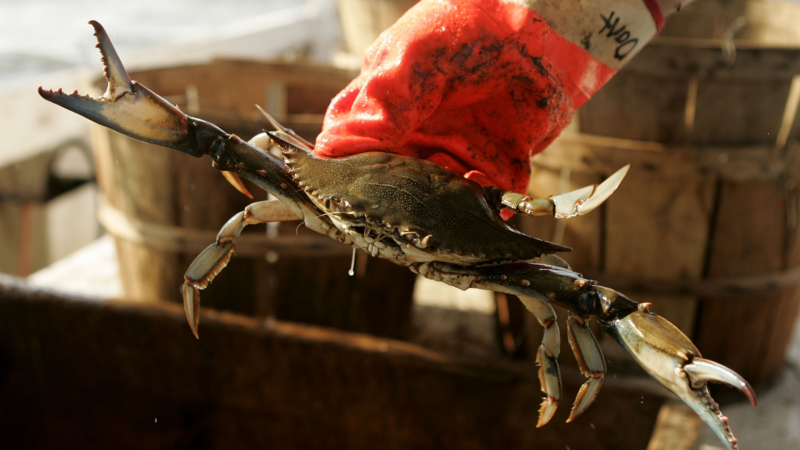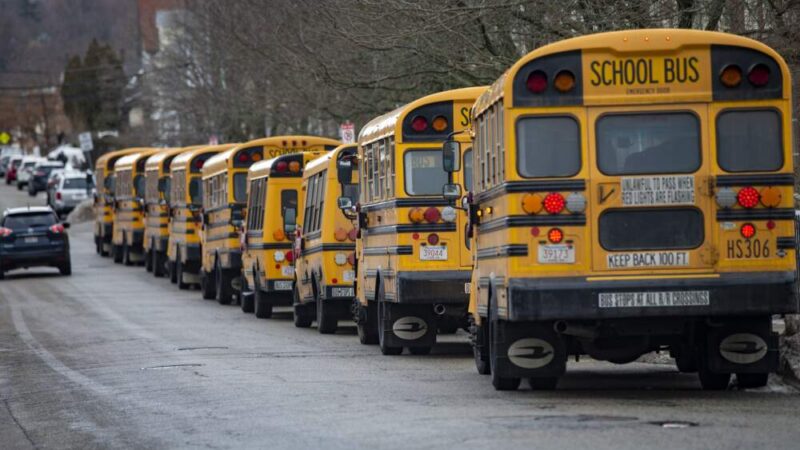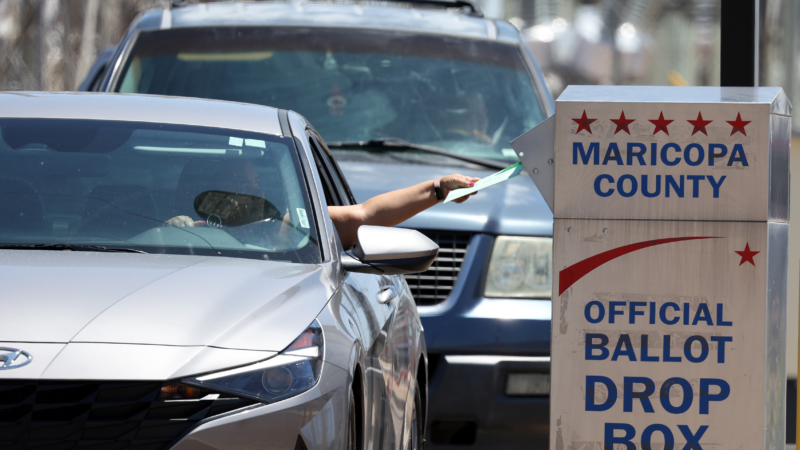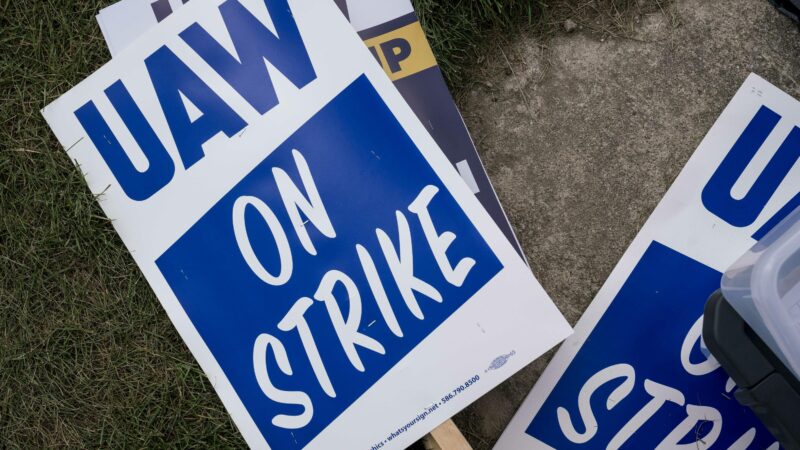Winter crabbing strained Chesapeake Bay’s blue crab population. It may soon resume
Blue crabs are perhaps the most iconic species in the Chesapeake Bay.
The crustacean, which is actually blue, is a favorite among seafood lovers, but pollution, habitat loss and harvest pressure are all threats to its abundance.
“Years ago, we used to catch what we could sell,” says waterman Billy Rice. “Now we sell everything we can catch.”
Rice, now in his 60s, has been crabbing in the Chesapeake since 1968.
Tensions over the health of the Chesapeake Bay and its wildlife have been simmering for a while, but now they’re bubbling over.
Earlier this summer, a group of Virginia watermen voted to explore the possibility of year-round crab fishery, but conservationists worry what that could mean for the health of the Bay.
Five years ago, the blue crab population was estimated to be about 600 million. Now officials say it’s closer to half that number.

On an August morning, Billy Rice and his son Rocky are out on a boat in the Potomac River, which flows into the Chesapeake. Rocky lifts a crab pot — essentially a large wire cage — from the water while Billy sorts the crabs by size.
Rice says that he and his son have about 300 crab pots.
“They’re basically placed on the bottom with a buoy, or a float, that you can retrieve them by, baited with razor clams,” Rice says.
The Rices are out on the water three days a week, starting at dawn, but they can’t get by on crabbing alone. A day’s catch puts about $400 in their pocket, so on the days they’re not crabbing, they have other jobs.
“I have a grain operation. I farm,” Rice says. “Rocky has a catfish operation. He catfishes.”
A year-round crab season would affect people like the Rices profoundly. Right now, the season runs from about April to November in the Chesapeake Bay.
“Historically, crabbing in Virginia took two forms — crab pots, which everyone in Virginia is pretty familiar with, and crab dredging during the winter,” says Zach Widgeon, communications director for the Virginia Marine Resources Commission, or VMRC.
The VMRC is expected to make a final decision about whether to extend crabbing through the winter at its meeting on Oct. 28.
“An initiative like a year-round fishery, it’s aiming to stabilize our crabbing industry,” Widgeon says. “You know, they suffer pretty hard economically during periods of limited fishing activity.”
Until 2008, Virginia and Maryland used to allow crabbing year-round. But a decline in population led to a 16-year prohibition on winter dredging.
Chris Moore, a conservationist with the Chesapeake Bay Foundation, says reinstating winter crab dredging could further jeopardize the blue crab population.
“Blue crabs migrate throughout the summertime, but during the winter, they actually become kind of semi-hibernative,” Moore says. “And so what that means is they generally kind of stop moving, and they kind of burrow down into the sand or the mud bottom of the Chesapeake Bay and its tributaries.”
Overharvesting female blue crabs, Moore says, is the biggest concern.
“After they come out of their semi-hibernative state in the winter, they’re the first ones to start spawning that year, and hopefully producing the next generation of blue crabs,” Moore says.

Maryland officials say the species’ recovery can be traced to the 2008 prohibition on winter crab dredging and that the Virginia watermens’ decision could create a rift in the long-standing partnership between the two states when it comes to the Bay.
But the effort to create a year-long fishery may be losing steam.
At the end of August, the Crab Management Advisory Committee recommended that the VMRC delay reopening the winter season until a stock assessment of the blue crabs is complete in 2026.
Back on the crab boat, Billy Rice — who was born and raised on a Maryland tobacco farm — says he’s against winter crab dredging because it could mean even fewer crabs in the Bay.
“I think it’s just important to understand that, you know, we have a privilege to crab. It’s not a right to crab,” Rice says. “We have to have respect for the resource…so that we have crabs for future generations.”
Obed Manuel edited this digital story.
Transcript:
MICHEL MARTIN, HOST:
Tensions over the health of the Chesapeake Bay and its wildlife have been simmering for a while, but now they’re bubbling over. Some Virginia officials want to let watermen catch blue crab in the bay year-round, but critics worry that that would put too much strain on the fragile blue crab population. NPR’s Julie Depenbrock has this report.
JULIE DEPENBROCK, BYLINE: Blue crabs are perhaps the most iconic species in the Chesapeake Bay. The crustacean – which is actually blue – is a favorite among seafood lovers, but pollution, habitat loss and overharvesting are all threats to its abundance.
BILLY RICE: Years ago, we used to catch what we could sell.
DEPENBROCK: That’s Billy Rice. He’s been crabbing in the Chesapeake since 1968.
RICE: Now we can sell everything we can catch.
DEPENBROCK: Five years ago, the blue crab population was estimated to be about 600 million. Now officials say it’s closer to half that number. Today, Rice and his son Rocky are on a boat in the Potomac River, which flows into the Chesapeake. Rice shows me a crab pot – a large wire cage.
RICE: They’re basically placed on the bottom with a buoy, or a float, that you can retrieve them by, baited with razor clams. And we work on a rig of about 300 pots.
DEPENBROCK: The Rices are out here three days a week, starting at dawn, but they can’t get by on crabbing alone. A day’s catch puts about $400 in their pocket, so on the days they’re not crabbing…
RICE: I have a grain operation. I farm. Rocky has a catfish operation. He catfishes.
DEPENBROCK: A year-round crab season would affect people like the Rice’s profoundly. Right now, the season runs from April to November in the Chesapeake.
ZACH WIDGEON: Historically, crabbing in Virginia took two forms – crab pots, which everyone in Virginia is pretty familiar with, and crab dredging during the winter.
DEPENBROCK: That’s Zach Widgeon. He’s the communications director for the Virginia Marine Resources Commission. The commission vote next month could extend crabbing through the winter.
WIDGEON: An initiative like a year-round fishery, it’s aiming to stabilize our crabbing industry. You know, they suffer pretty hard economically during periods of limited fishing activity.
DEPENBROCK: Virginia and Maryland used to allow crabbing year-round – until 2008, when a decline in population led to a prohibition on winter dredging. Chris Moore is a conservationist with the Chesapeake Bay Foundation. He says reinstating winter crab dredging could put blue crabs at even greater risk.
CHRIS MOORE: Blue crabs migrate throughout the summertime, but during the winter, they actually become kind of semi-hibernative. And so what that means is they generally kind of stop moving, and they kind of burrow down into the sand or the mud bottom of the Chesapeake Bay and its tributaries.
DEPENBROCK: Moore says overharvesting female blue crabs is the biggest concern.
MOORE: After they come out of their semi-hibernative state in the winter, they’re the first ones to start spawning that year, and hopefully producing the next generation of blue crabs.
DEPENBROCK: Maryland officials say the species recovery can be traced to the 2008 prohibition on winter crab dredging and that the Virginia watermen’s decision creates a rift in the long-standing partnership between the two states when it comes to the bay. Back on the crab boat, Billy Rice – who was born and raised on a Maryland tobacco farm – says he’s against winter crab dredging because it could mean even fewer crabs in the bay.
RICE: I think it’s just important to understand that, you know, we have a privilege to crab. It’s not a right to crab.
DEPENBROCK: Rice says they have to have respect for the resource, so there will be crabs left for future generations.
RICE: Those are nice crabs.
DEPENBROCK: Julie Depenbrock, NPR News.
(SOUNDBITE OF MUSIC)
Hiccups from new bus tracker app and late student registrations behind bus delays, Boston leaders say
Mayor Michelle Wu says she's confident that the system will consistently improve once new student registrations slow down after a late summer surge and drivers work through new tracking technology glitches.
A records flaw could block thousands in Arizona from voting in state and local races
Arizona officials say the flaw could disqualify nearly 100,000 people from voting in non-federal races. At issue is proof of citizenship records required by the state to participate in such elections.
A man’s therapist challenged him to a race. He said it was a spark of life
On this week's "My Unsung Hero:" In 2014, Wil was being treated for major depression at an inpatient mental health program. One day, his therapist issued a challenge that renewed his sense of purpose.
The body transforms in remarkable ways during pregnancy. So does the brain
NPR's Ari Shapiro talks with Emily Jacobs of UC Santa Barbara about how pregnancy reshapes the brain, the subject of a study out this week in the journal Nature Neuroscience.
A year after the strike is the UAW still winning?
A year ago at this time, members of the United Auto Workers Union were feeling powerful and optimistic. The group's new President Shawn Fain had called a historic strike. For the first time, the Union walked out on ALL three big automakers. It was a bold move that by most measures worked. It ultimately brought Ford, GM and Stellantis much closer to the union's demands for historic raises and new job protections. The strike's success had people predicting a bigger and more powerful union.A year on the union is still staring down some major challenges. For sponsor-free episodes of Consider This, sign up for Consider This+ via Apple Podcasts or at plus.npr.org.Email us at [email protected].
Sean ‘Diddy’ Combs is arrested and indicted on counts of racketeering, sex trafficking
The music mogul Sean “Diddy” Combs was arrested late Monday night in New York and indicted on federal charges of sex trafficking and racketeering.





